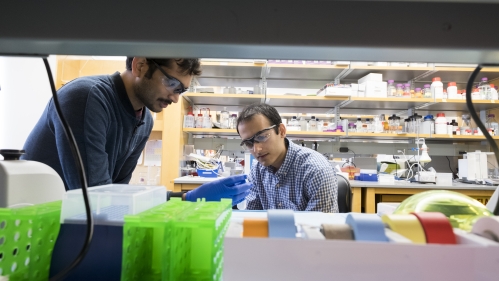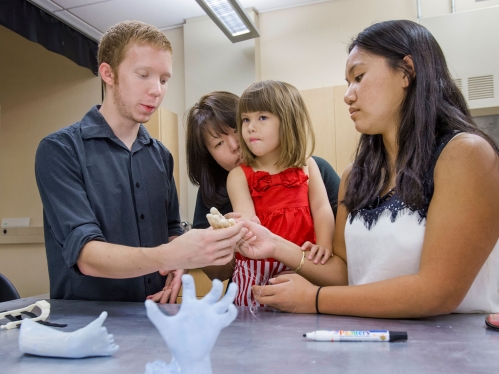BME Curriculum
The BME program offers three main curriculum concentrations: biomedical computing, imaging, and instrumentation; biomechanics and rehabilitation engineering; and tissue engineering and molecular bioengineering.

Biomedical Engineering Undergraduate Admissions
What is Biomedical Engineering?
Biomedical engineering is an exciting field that’s on the cutting edge of innovative medical advances. Biomedical engineers design prostheses, artificial organs and pharmaceutical products that directly improve quality of life for millions of people. They also design and manufacture diagnostic and therapeutic devices and imaging equipment that give doctors and medical researchers the tools to identify and treat a wide range of illnesses and injuries.
Program Overview
Modern applications of Biomedical Engineering encompass a wide range of technical areas. The goal of the Rutgers Biomedical Engineering Department is to educate its students with a broad base in core biomedical engineering, and provide depth in the frontier areas of biomedical engineering profession through exposure to key areas of specialization.
The entire spectrum of these application areas is organized into three distinct tracks:
Based on the choice of the track, the student can then design the appropriate technical electives, life-science electives, and departmental electives supportive of the track at junior and senior levels.

Beyond Academics
Rutgers is located in the heart of one of the world’s highest concentrations of health care companies. New Jersey is the fourth-largest biotech center in the U.S., home to more than 130 biotech companies; nearly half of the nation’s $30-billion private health research takes place here.
This gives Rutgers unparalleled access to leaders and innovators in the field as well as to resources, including research funding and internship opportunities for our students. We are proud to have executives from a wide range of companies including Siemens, Johnson & Johnson and Merck on our industry advisory board.

Putting Your Degree to Work
A career in biomedical engineering is an excellent option for someone interested in medicine, but who may prefer working behind the scenes rather than directly with patients. It’s a high-paying and rapidly advancing field. Biomedical engineers are employed by industry, including multinational corporations and start-ups, as well as government agencies, hospitals and academic institutions in the forefront of research.
The department’s Industrial Internship Program provides students with valuable work experience, where they apply their coursework and skills to a wide range of paid engineering positions at some of the nation’s leading biomedical corporations. Many students extend these experiences into collaborations on their senior design projects and also into full-time positions after graduation.


Learn More
BME Curriculum
The BME program offers three main curriculum concentrations: biomedical computing, imaging, and instrumentation; biomechanics and rehabilitation engineering; and tissue engineering and molecular bioengineering.
Contact Information
Undergraduate Director
Kristen Labazzo, PhD
Associate Teaching Professor, Undergraduate Director
848-445-6578
Sakala@soe.rutgers.edu
Elaine Connors
Program Coordinator
848-445-6869
econnors@soe.rutgers.edu